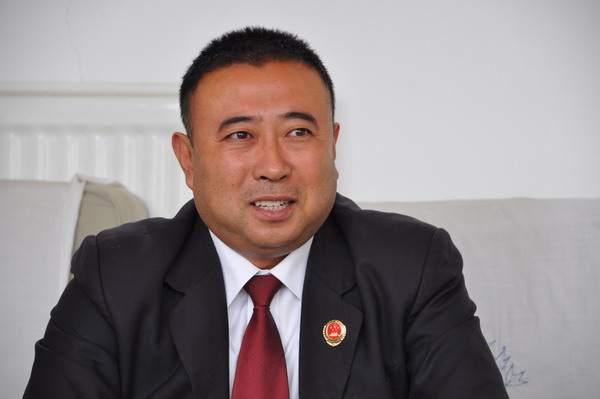Officer sees role as bridge
Updated: 2011-10-28 07:57
By Cao Yin (China Daily)
|
|||||||||||
|
 Du Quantang, a grassroots prosecuting officer in Beijing's Pinggu district. [Photo/China Daily]
|
BEIJING - Sitting next to a 60-year-old woman, Du Quantang had been listening for about 20 minutes to her repeated complaints about an ongoing land dispute with the village committee.
"I have less money now. The land is my main financial source. Why did the committee withdraw the land without any explanation? You must represent my appeal to them," she said, pouring out her discontent in one quick sentence after another.
Du tried to break in but swallowed his words to show respect.
When the woman finally stopped complaining, Du picked up a cold steamed stuffed bun and asked her, "Is this what you have for lunch? It's not good for your health. You need to first take good care of yourself if you really want to solve the problem."
"I understand your anxiety. But the committee did the right thing in accordance with the contract," he said, and improved his tone.
"I have helped other villagers solve land disputes. I believe I can also do you a favor."
Neither a warm-hearted neighbor nor a lawyer, 45-year-old Du is a grassroots prosecuting officer in Beijing's Pinggu district. For the woman and her fellow villagers, the man wearing the deep blue uniform is their "legal village head".
An alternative channel to voice their cry for justice, the program of legal head officer began in 2008 and has been extended to most of Beijing's countryside. Currently, 115 prosecuting officers are sent to about 300 villages.
Du visits three villages a week. His main work is to help villagers deal with neighborhood conflicts and legal disputes with the village committee.
Explaining the law to villagers is a major challenge.
"Most of them are poorly educated. I must translate regulations patiently in the simplest way, after people unburden themselves of all their complaints," he said.
His explanations usually come in vain, because villagers always believe they are the victims, even though according to the law they may not be.
"I am like a bridge between villagers and the village committee. But who knows about my embarrassment and difficulties to establish the bridge?" he told China Daily.
Early one morning this year when he arrived in a village, he was surrounded by more than 30 men armed with shovels.
"They had a disagreement about the land distribution with the committee which hadn't been solved for a long time," he said.
"They were very angry and even wanted to beat me. I was so scared to tell the truth," he said, adding that he felt like a scapegoat.
He calmed them down and showed his willingness to hear their grievances.
"Doing the legal work in village, listening is the first, which is also a comfort to those villagers. I'll mention some similar cases to them and help them analyze how to use the law to protect their interests," he said.
Du said he once was a hot-tempered man, but has softened after being the legal village head.
"The energetic work also makes me more active and open-minded," he said.
A grocery store in Xiaobeiguan, one of villages Du is responsible for, is where he often comes for a short break during work.
"Sometimes, we talk about our family and children," store owner Zhang Chunge said.
Zhang has an 18-year-old son who rides a motorcycle with friends at midnight, which makes the mother worried and angry. Their relationship was cold in the past and she often shouted at the boy for no reason.
"Du suggested I should give my son more freedom and communicate with him in a soft way," she said.
"I took his advice. Now my son returns home earlier," she said happily.
However, Du has not found a good way to communicate with his own son. The 17-year-old often ignores him and stays in his room.
"I have difficulty starting a conversation with him," Du said with a sigh.











